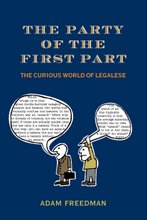With impeccable legal logic, "civil death" is a term that can only apply to people who are perfectly alive. But some living people -- and here we're talking about felons -- are deemed to be "civilly dead," meaning that they have forfeited all civil rights, such as the right to sue or vote. Various state statutes have enshrined civil death, such as the Utah code that declared, somewaht oddly that a life prisoner is "deemed civilly dead" -- and yet, even a civil corpse was allowed to make conveyences. Watch out for "Night of the Civilly Dead" at a theater near you!
Oddly enough, the concept of civil death came from Church law. In the thirteenth-century, the legal scholar declared that monks experienced mors civilis (civil death), in that they could not sue or be sued, or hold property. These days, of course, civil death is a concept that prisoners rights groups are trying to bury.
Update: Jim Rose points out that he addresses "civil death" (humorously) in the context of cryogenic freezing in his book The Supreme Court Jester. Read the passage here.
(I also explore the legal language of cryogenics, cloning, UFO's and other futuristic phenomena in Chapter 10 of my book, The Party of the First Part.)

No comments:
Post a Comment